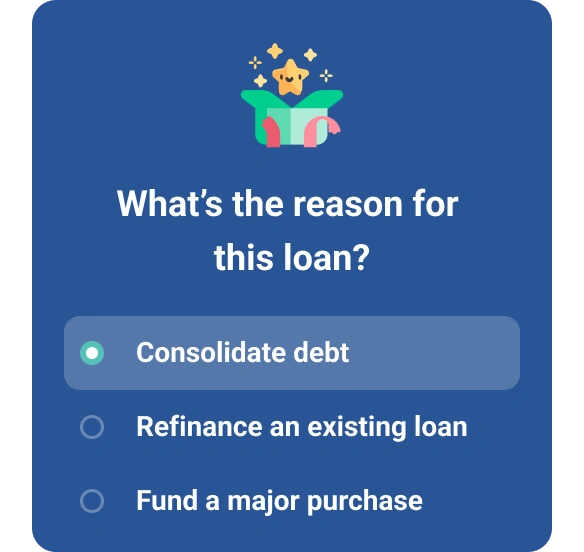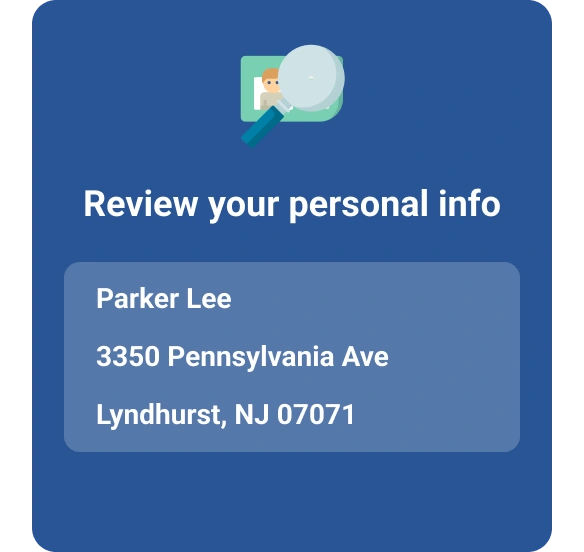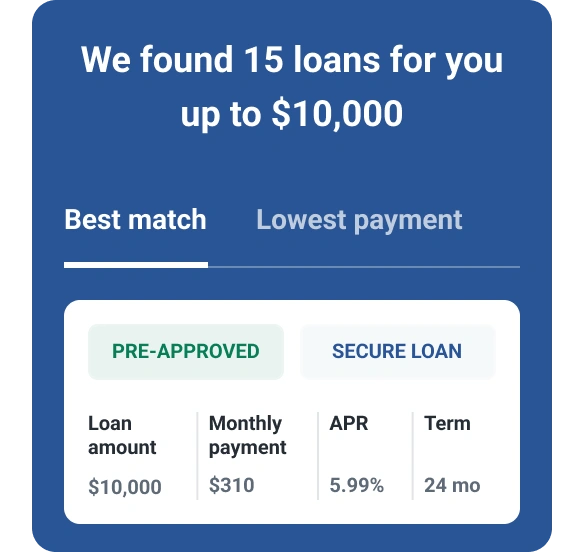Personal Loan vs. Credit Card: What’s the Difference?

Two common options for borrowing money are personal loans and credit cards. A personal loan provides a fixed amount of money that can be used for various personal expenses, while a credit card offers revolving credit up to a limit. Understanding the differences between the two can help you make an informed borrowing decision in line with your financial needs.
| Personal Loan | Credit Card | |
|---|---|---|
| Type of credit | Installment | Revolving |
| Interest rate | Fixed; typically lower than credit cards | Variable; typically higher |
| Introductory offers | Usually none | Some offer introductory low or 0% APRs and/or intro bonuses |
| Limit | Up to $100,000 | Up to $40,000+ |
| Fees | May include origination, application, prepayment or late fees | May include annual, late, cash advance, foreign transaction or balance transfer fees |
| Repayment | Fixed monthly payments over 1 to 7 years | Minimum monthly payments based on current balance |
| Credit requirements | Varies; higher credit scores typically get better rates | Varies; credit score affects approval and interest rate |
| Availability | Paid as a one-time lump-sum deposit to your bank account | Continuous access to credit, up to your credit limit |
| Rewards | None | May offer cash back, points or travel miles |
| Grace period | None | Yes, if balance is paid monthly |
What Is a Personal Loan?
A personal loan is a type of installment loan. It allows you to borrow a fixed amount of money and repay it in equal monthly installments over a set term, one to seven years. Most personal loans are unsecured, meaning they don't require collateral, such as a car or home, to qualify.
Loan amounts can reach up to $100,000. Your approval, loan amount and interest rate depend on your credit score, credit history and income. Generally, the better your credit score, the more favorable the terms you're likely to receive.
One of the main benefits of a personal loan is the flexibility you have in how you can use the funds. Common uses include:
- Debt consolidation
- Home repairs or improvements
- Medical bills
- Large or unexpected expenses
- Major purchases
Learn more: What Can a Personal Loan Be Used For?
How a Personal Loan Can Impact Your Credit Score
Taking out a personal loan will affect your credit, and its impact depends largely on how you manage the loan.
When you apply, the lender performs a hard inquiry, which could cause a small, temporary dip in your credit score. If approved, the loan will increase your overall debt, which could lower your score.
Late or missed payments can significantly damage your credit score and remain on your credit report for seven years.
On the other hand, as you pay off the loan, making consistent, on-time monthly payments can add positive payment history to your credit report and help boost your credit score over time.
Learn more: How Does a Personal Loan Impact Your Credit Score?
Pros and Cons of Personal Loans
There are several advantages and disadvantages to using personal loans, depending on your situation.
Pros
-
Lower interest rates: Personal loans often have lower interest rates than some other borrowing options, such as credit cards, especially if you have good credit.
-
Predictable monthly payments: Fixed loan terms and monthly payments make it easier to make and stick to a budget.
-
Large loan amounts: The potential ability to borrow up to $100,000 gives you access to funds for major financial needs that you couldn't finance with a credit card or savings.
-
Flexible borrowing: Personal loans can be used for a wide range of expenses. While some lenders restrict you from using personal loans to pay for education costs, nearly all other personal expenses are eligible.
Cons
-
No rewards or perks: Personal loans don't offer cash back, points or other incentives for spending.
-
Lump-sum disbursement: You must borrow the full amount you need upfront. After the loan funds have been disbursed, you can't access additional money without applying for another loan.
-
No grace period: Interest begins accruing as soon as the loan is disbursed. There's no option to avoid interest charges by repaying early.
Tip: Some lenders offer interest rate discounts if you already have an account or banking relationship with them. Check with your bank or credit union, or your current credit card company, to see if personal loans are available and if you could benefit from borrowing from them.
What Is a Credit Card?
A credit card is a revolving line of credit that lets you borrow up to a set credit limit. You can use the card to make purchases, transfer balances and possibly withdraw cash. As you repay your balance, your available credit is replenished, allowing you to borrow again without submitting a new loan application.
Credit card approval, your credit limit and your interest rate are generally based on your credit score and income. Most credit cards charge variable interest rates, which were above 21% as of May 2025. If you don't pay your bill in full by the due date, your balance will grow as interest accrues, even if you stop using the card.
However, many credit cards offer a grace period. If you pay your full balance by your monthly due date, you won't be charged interest on your purchases.
Many credit cards also offer rewards programs that add value to your spending by allowing you to earn cash back, points or travel miles on your purchases. Some provide introductory 0% annual percentage rate (APR) offers that allow you to avoid interest altogether for a number of months.
Learn more: What Credit Card Should I Get?
How a Credit Card Can Impact Your Credit Score
Like personal loans, credit cards can both help and hurt your credit, depending on how they're used.
Applying for a new credit card results in a hard inquiry on your credit report, which can temporarily lower your credit score by a few points. Additionally, high balances relative to your credit limit can lower your score. However, your score can improve as you pay down your balance.
Keep in mind that opening a new credit card account may reduce your average credit age, which could also lower your credit score. Making regular, on-time payments will build your payment history and could boost your score.
Pros and Cons of Credit Cards
Credit cards can be a useful tool, but they also come with potential drawbacks.
Pros
-
Revolving credit line: You can limit your debt by borrowing only as much as you need at a time. Then, you have the flexibility to reuse your available credit as you pay down your balance.
-
Fast approval: Most credit card applications are processed quickly. You'll typically learn whether you're approved within minutes when you apply online, giving you access to spending right away.
-
Rewards and bonuses: Many cards allow you to earn valuable perks like cash back, points or miles on your purchases. You can redeem your rewards for statement credits, gift cards, travel and more.
-
Introductory offers: Some credit cards offer introductory 0% interest on purchases or balance transfers for the first six to 21 months. You can completely avoid paying interest by paying off your balance during the interest-free period.
-
Purchase protections: Credit cards often include a variety of perks, such as fraud protection, extended warranties and other benefits that can safeguard your purchases.
Cons
-
High interest rates: Credit card APRs are generally higher than other forms of credit and can exceed 29%. If you carry a balance beyond the grace period, borrowing can become expensive.
-
Temptation to overspend: Easy access to credit can lead to impulsive purchases, increasing your debt and interest cost. It's important to keep your credit card purchases within an affordable range.
-
Fees: Annual fees, late fees, balance transfer fees and foreign transaction fees may apply. Paying these increases your borrowing costs.
-
Unpredictable payments: Minimum payments can vary depending on your balance. Not having a fixed monthly payment can make budgeting difficult.
-
Credit score risk: High credit card balances can raise your credit utilization and lower your credit score. With responsible use, your score can recover as you pay down your balance.
Learn more: How to Apply for a Credit Card
Is a Personal Loan or Credit Card Cheaper?
The cheaper option depends on how much you plan to spend, your timeline for repaying the purchase and the interest rate you qualify for.
Generally, personal loans are cheaper for large purchases and when you need several months to pay off debt. They offer lower interest rates than a credit card's standard APR. Credit cards are cheaper if you plan to make a small purchase and can repay it by your due date, since you can avoid interest altogether.
Tip: The cheapest option is qualifying for an intro 0% APR credit card—you can secure no interest for up to 21 months and save more money than using a personal loan.
Should You Get a Personal Loan or a Credit Card?
Both personal loans and credit cards can be useful financial tools, depending on your specific needs and goals.
When to Consider Getting a Personal Loan
A personal loan may be the right choice if:
- You're financing a large purchase. A personal loan can help you pay for an expensive item or project that exceeds your available savings.
- You want predictable monthly payments. Fixed interest rates and monthly payments give you a clear repayment schedule. This simplifies budgeting and long-term planning.
- You're consolidating high-interest debt. If you qualify for a lower interest rate, a personal loan can help you consolidate and repay high-interest credit card debt more affordably. You'll save interest and pay down your debt faster.
- You prefer a lower interest rate. If you expect to carry a balance, a personal loan could be less expensive than a high-interest-rate credit card.
- You're making home improvements. You can finance home renovations or repairs without using your home as collateral and risking foreclosure.
Tip: Use a personal loan calculator to estimate your monthly payments and total loan cost before applying.
When to Consider Getting a Credit Card
A credit card may be a better option in certain scenarios:
- You're making smaller, frequent purchases. Credit cards allow for greater flexibility in making multiple purchases, such as for everyday spending.
- You want to earn rewards. Your spending can earn cash back, points or miles that you can use to pay down your balance, book travel and more.
- You qualify for an introductory 0% APR offer. You can make interest-free purchases—or transfer the balances of other credit cards—if you repay the balance before the promotional period ends.
- You want ongoing flexibility. A credit card gives you the ability to borrow and repay repeatedly without having to reapply.
The Bottom Line
Both personal loans and credit cards offer access to credit, but they serve different purposes. Personal loans offer structure, lower rates and access to larger loan amounts, while credit cards offer flexibility, rewards and convenience. The best option depends on your spending needs, repayment ability and financial goals.
Before applying, check your FICO® ScoreΘ to understand your approval odds and potential rates. This can help you make an informed decision and avoid financial stress down the road. Experian can also help you find personal loans and credit cards you may be matched with based on your credit profile without hurting your credit score.
Need a personal loan?
Whether you're looking to eliminate debt or access cash fast, compare personal loan offers matched to your credit profile.
Start now for freeAbout the author
LaToya Irby is a personal finance writer who works with consumer media outlets to help people navigate their money and credit. She’s been published and quoted extensively in USA Today, U.S. News and World Report, myFICO, Investopedia, The Balance and more.
Read more from LaToya

